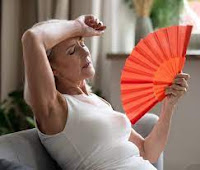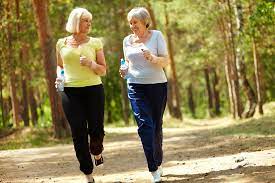The M Word - Women spend 1/3 of their lives Postmenopausal
I've written before about the menstrual cycle I think it's very important to talk around all the health issues women face, not just fitness.
It's also very important as a trainer to have as much information as you can to help your female clients.
I recommend books and podcasts to my female clients to empower them to take action to help improve their symptoms. The science around menopause is evolving all the time and that's great news for women looking for help.
Below I have noted some of the aspects of a healthy lifestyle which I help my clients to incorporate:
1. Firstly, if you are having symptoms that are impacting your day to day life, please go and speak to your GP. You really don't have to suffer in silence. You might be able to take some simple steps to being much more comfortable.
2. Eat a healthy balanced diet (I know you know that!) No food has to be banned and there are no good/bad foods. Let's keep food neutral. Some things naturally need to be eaten more often than others.
3. Aim for 5 portions of fruit and veg a day. Increase the fibre content of your meals by adding loads of veggies, pulses, nuts and seeds and eat the skin of those fruits and veggies!
4. Cut down or limit saturated fat and perhaps swap for leaner meat or vegetarian/vegan protein sources. Limit processed meats, they are high in saturated fat and linked to heart disease and cancers.
5. Some fat in your diet is a good idea, especially from oily fish, nuts and avocados. Ideally two portions per week, you will get the added benefit of good heart health.
6. Spicy foods are known to trigger hot flushes so avoiding those might help.
7. Vitamin D - Adults in the UK are advised to supplement 400IU per day as we don't get enough exposure to the sun.
8. If you are are at risk of osteoporosis or are concerned about your bone health a calcium and Vitamin D supplement may help.
9. Stay well hydrated, too much information but your wee will tell you if you are sufficiently hydrated or not!
10. Caffeine can trigger hot flushes so limiting your intake might help. Also, if your sleep is affected by menopause then avoiding caffeine after 12pm can help as it can impact the quality of your sleep. You could also find a nice decaffeinated option.
11. Drinking alcohol can worsen some menopause symptoms and is associated with an increased risk of osteoporosis. Staying within the guidelines for the number of units a woman should drink cab help. Aim to have 2-3 alcohol free days per week.
Exercise
Studies have now show that women who do cardiovascular exercise, walking/running/cycling/swimming/aerobic based classes have fewer menopausal symptoms.There are many other health benefits relating to exercise, obviously. In relation to menopause symptoms improving your cardiovascular health can help you manage your weight and also improve your mood and generally make you feel more energetic.
There are now studies which show that if you are fit and exercise regularly it can reduce hot flushes.
If you are unfit as your menopause symptoms start your flushes may get worse initially, so start gently and build up gradually, as you would at any point in your life!
How Much?
The government guidelines are for 150 minutes of moderate intensity per week. This can be brisk walking or 75 minutes at a higher intensity such as running or high intensity type training as well as two resistance based sessions per week.
The most important aspect of exercise (in my opinion!) is that you enjoy it. Okay if it's been a long time since you have regularly exercised you might not totally love it immediately (but keep going once you do start, you will feel differently in time!)
Join a class, get involved in a team sport that you used to enjoy. Try lots of different things to see what you enjoy.
We know that women are at risk of osteoporosis and weight bearing exercise has been proven to help. Our bones are constantly remodelling. Weight bearing exercise encourages bones to become strong.
My Postmenopausal strength icon
Joan MacDonald aged 74, isn't she phenomenal!
Osteoporosis
Women become more susceptible to osteoporosis due to estrogen deficiency. During the menopausal transition period the reduced estrogen leads to more bone resorption than formation, resulting in osteoporosis.
It is an important and often overlooked aspect of women's health at this stage in our life. Supplementation and medication are options but these must be provided by a qualified medical practitioner. You can take control of your nutrition and exercise needs (as mentioned above) to support your bone health.
Strength based or resistance exercise means using your muscles against resistance which pulls on your bones and they react by becoming stronger. The stronger your muscles are, the stronger the pull on your muscles and the stronger your bones become.
Resistance can be generated by bodyweight, weights, machines and bands. Press ups, squats, lunges are all great bodyweight forms of resistance training.
Get empowered and ask for help if you need it x





Comments
Post a Comment